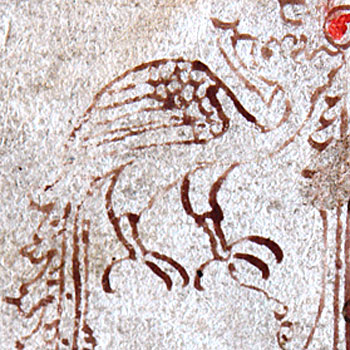Sir Amadace
General Information
Plot Summary

[The opening lines are missing in both manuscripts] Sir Amadace, who is heavily in debt, is discussing courses of action with his steward. Rather than face ridicule, he mortgages his lands, gives away everything except forty pounds, and leaves the country, accompanied by three servants. In a forest they come across a chapel where a widow watches over the rotting body of her husband - a merchant who spent beyond his means on alms, feasts and gifts. Thirty pounds of his debts remain unpaid and the final creditor has threatened to have the corpse savaged by hounds. Recognising the parallels with his own situation, Amadace goes to the city and pleads with the creditor, another merchant, to forget the debt. When he refuses, Amadace pays him with his own money, using his last ten pounds to arrange a lavish funeral.
After leaving the city, Amadace dismisses his servants and considers his fate, praying to God for help. He is overheard by a knight, dressed entirely in white, who tells him of a forthcoming tournament held by the king, who is seeking a husband for his daughter. He offers to help Amadace, in return for half of whatever he wins. Amadace agrees and, following the white knight’s instructions, goes to the shore, where he finds a rich shipwreck. He takes what he needs and tells the king’s messengers that he is a great prince whose ships have run aground. He is welcomed into the court and assembles a retinue, offering them rich rewards. Amadace performs well in the tournaments, and is rewarded with the princess and half the kingdom.
Shortly after his wife bears a son, the white knight returns. Amadace welcomes him as a brother, but he refuses hospitality and demands half of what Amadace has won: not his property but his wife and child. Despite Amadace’s pleas for mercy, he continues to insist, until the princess tells her husband that he must honour his promise. She summons her son and waits calmly to be divided into two. But as Amadace raises his sword, the white knight stops him. He reveals that he is the merchant that Amadace helped bury, and that he has been praying to God to reward Sir Amadace. He leaves, and the couple thank God and Mary for their good fortune. Amadace sends messengers into his homeland to pay off his debts and summon his servants, and the couple live happily and prosperously until the old king dies and Amadace inherits his kingdom.
From: M. Mills Ed. Six Middle English Romances. London: J.M. Dent, 1992.
Manuscript: Princeton, University Library, Robert H. Taylor Collection MS 9 (olim. Ireland Blackburn).
Manuscripts
Click a title below to search for all romances in that manuscript.